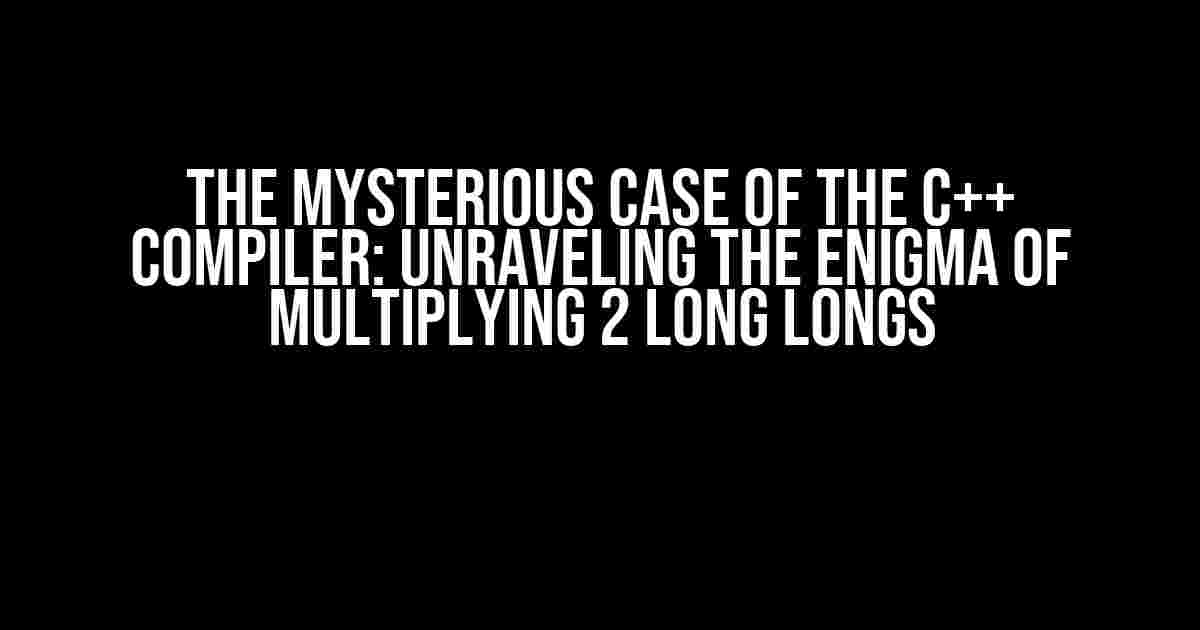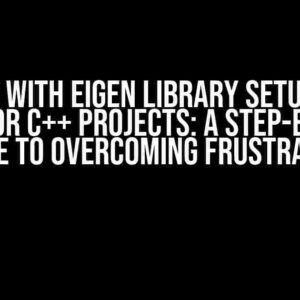If you’re reading this, chances are you’ve stumbled upon a peculiar issue that has left you scratching your head. You’ve written what seems like a perfectly innocuous C++ program, only to be greeted by an unexpected error when attempting to multiply two long long integers. Fear not, dear programmer, for you’re not alone in this predicament. In this article, we’ll delve into the depths of the C++ compiler, uncover the root cause of this issue, and provide you with a comprehensive guide on how to overcome it.
Background: The C++ Compiler’s Gotcha
Before we dive into the solution, let’s first understand the underlying cause of this issue. In C++, the long long data type is used to represent 64-bit integers. When you multiply two long long variables, the compiler generates code that performs the multiplication using 128-bit registers. However, the resulting product is temporarily stored in a 128-bit register, which is not a standard C++ type.
This is where the problem arises. The C++ compiler, in its infinite wisdom, attempts to convert the 128-bit result to a 64-bit long long value, which leads to an overflow error. This error is often manifested as an unexpected error message, leaving you bewildered and wondering what went wrong.
Symptoms of the Issue
If you’re experiencing any of the following symptoms, it’s likely that your C++ compiler is yielding an unexpected error when multiplying 2 long longs:
- Error messages such as “overflow in implicit constant conversion” or “integer overflow in expression”
- Unexpected results or garbage values when multiplying two long long variables
- Inexplicable crashes or segmentation faults when performing arithmetic operations on long long values
Diagnosing the Issue: Understanding the Compiler’s Behavior
To better comprehend the compiler’s behavior, let’s examine a simple example that illustrates the problem:
#include <iostream>
int main() {
long long a = 1844674407370955161; // 2^64-1
long long b = 2;
long long result = a * b;
std::cout << "Result: " << result << std::endl;
return 0;
}In this example, we’re attempting to multiply two long long values: a, which represents the maximum value that can be stored in a 64-bit integer (2^64-1), and b, which is simply 2. The resulting product should be 3689348814741910322, but instead, the compiler will throw an error.
The reason behind this error lies in the way the compiler generates code for the multiplication operation. When the compiler encounters the expression a * b, it generates assembly code that performs the multiplication using 128-bit registers. The resulting product is temporarily stored in a 128-bit register, which is not a standard C++ type.
Compiler Output: A Closer Look
Using the -S flag with the GCC compiler, we can examine the generated assembly code for the above example:
__Z4mainv:
pushq %rbp
movq %rsp, %rbp
movq $1844674407370955161, -24(%rbp)
movq $2, -16(%rbp)
movq -24(%rbp), %rax
movq $0, %rdx
imulq -16(%rbp), %rax
movq %rax, -8(%rbp)
movq -8(%rbp), %rax
movq %rax, %rsi
movl $.LC0, %edi
movl $1, %eax
call _ZStlsISt11char_traitsIcEERSt13basic_ostreamIcT_ES5_c @plt
xorl %eax, %eax
popq %rbp
retIn this assembly code, the compiler generates an imulq instruction to perform the multiplication. The resulting product is stored in the %rax register, which is a 64-bit register. However, the compiler attempts to store the result in a 64-bit register, which leads to an overflow error.
Solutions: Overcoming the Compiler’s Limitations
Fear not, dear programmer, for we’ve reached the solution section! There are several approaches to overcome the compiler’s limitations and successfully multiply two long long values:
Method 1: Using a Third-Party Library (e.g., Boost.Multiprecision)
One of the most straightforward solutions is to utilize a third-party library that provides robust arithmetic operations for large integers. Boost.Multiprecision is an excellent choice, as it provides a comprehensive set of classes for arbitrary-precision arithmetic.
#include <boost/multiprecision/cpp_int.hpp>
int main() {
using namespace boost::multiprecision;
cpp_int a = 1844674407370955161; // 2^64-1
cpp_int b = 2;
cpp_int result = a * b;
std::cout << "Result: " << result << std::endl;
return 0;
}In this example, we’re using the cpp_int class from Boost.Multiprecision to perform the multiplication. This class provides arbitrary-precision arithmetic, ensuring that the result is accurate and free from overflow errors.
Method 2: Implementing Custom Multiplication
If you prefer to avoid third-party libraries, you can implement custom multiplication using standard C++ features. One approach is to use a technique called “double-double arithmetic,” which involves representing large integers as pairs of 64-bit values:
struct DoubleInt {
uint64_t high;
uint64_t low;
};
DoubleInt multiply(DoubleInt a, DoubleInt b) {
uint64_t ah = a.high;
uint64_t al = a.low;
uint64_t bh = b.high;
uint64_t bl = b.low;
uint64_t p0 = al * bl;
uint64_t p1 = ah * bl + al * bh;
uint64_t p2 = ah * bh;
DoubleInt result;
result.high = p2 + (p1 >> 32);
result.low = p0 + (p1 << 32);
return result;
}In this implementation, we represent large integers as pairs of 64-bit values (high and low) and perform multiplication using a combination of 64-bit arithmetic operations. The resulting product is stored in a DoubleInt structure, which can accurately represent the result.
Method 3: Using a Custom Compiler Flag (-fwrapv)
A lesser-known solution is to use a custom compiler flag, -fwrapv, which instructs the compiler to wrap around integer overflows instead of throwing an error. This approach requires careful consideration, as it can lead to unexpected behavior in certain scenarios:
gcc -fwrapv -o example example.cppBy using this flag, the compiler will wrap around integer overflows, allowing the multiplication to succeed. However, be cautious when using this approach, as it can lead to unexpected results in certain situations.
Conclusion
In conclusion, the issue of the C++ compiler yielding an unexpected error when multiplying 2 long longs is a fascinating puzzle that requires a deep understanding of the compiler’s behavior and the underlying arithmetic operations. By employing one of the solutions outlined in this article, you’ll be able to overcome this limitation and perform accurate arithmetic operations on large integers.
Remember, dear programmer, that the C++ compiler is a powerful tool that requires careful consideration and attention to detail. With patience, perseverance, and a dash of creativity, you can conquer even the most obscure compiler errors and create robust, efficient, and accurate programs that showcase the true power of C++.
| Method | Description | Pros | Cons |
|---|---|---|---|
| Using a Third-Party Library (e.g., Boost.Multiprecision) | Utilize a third-party library that provides robust arithmetic operations for large integers. | Easy to use, accurate results, and flexible. | Dependent on third-party library, potential performance overhead. |
| Implementing Custom Multiplication | Frequently Asked Question


